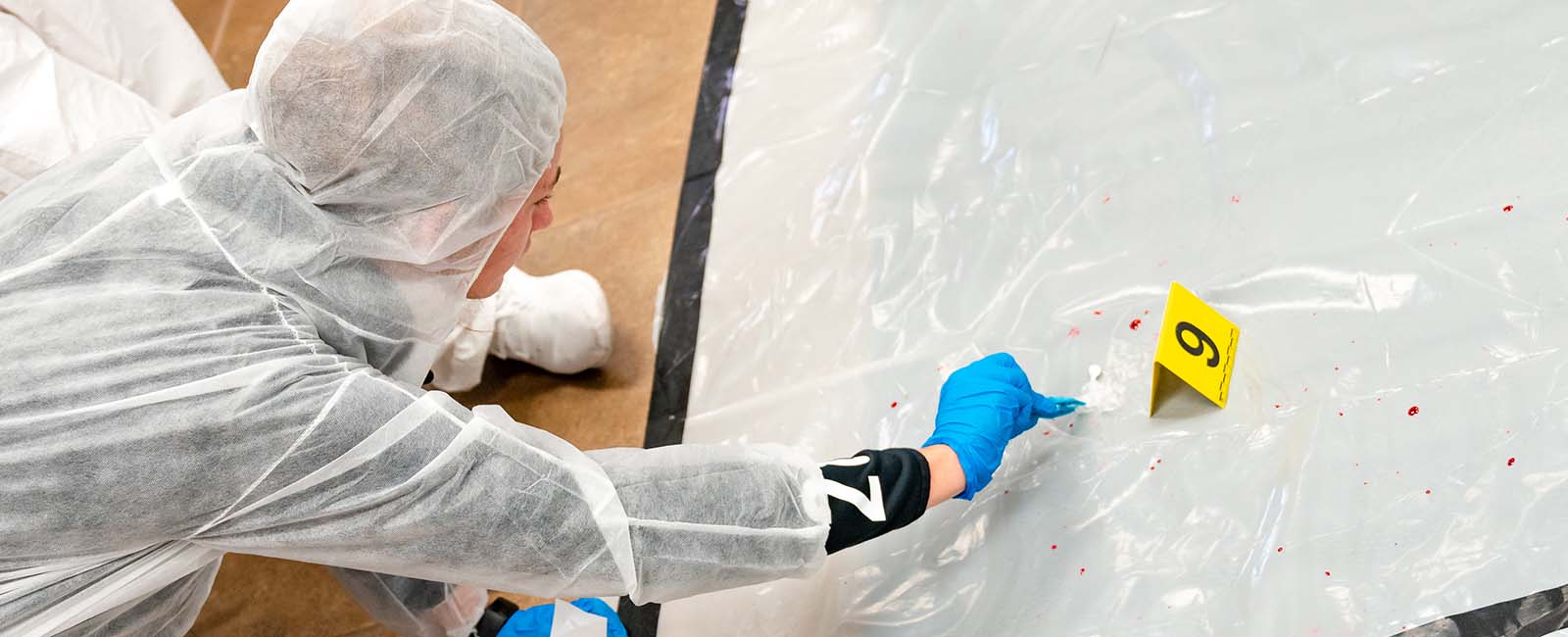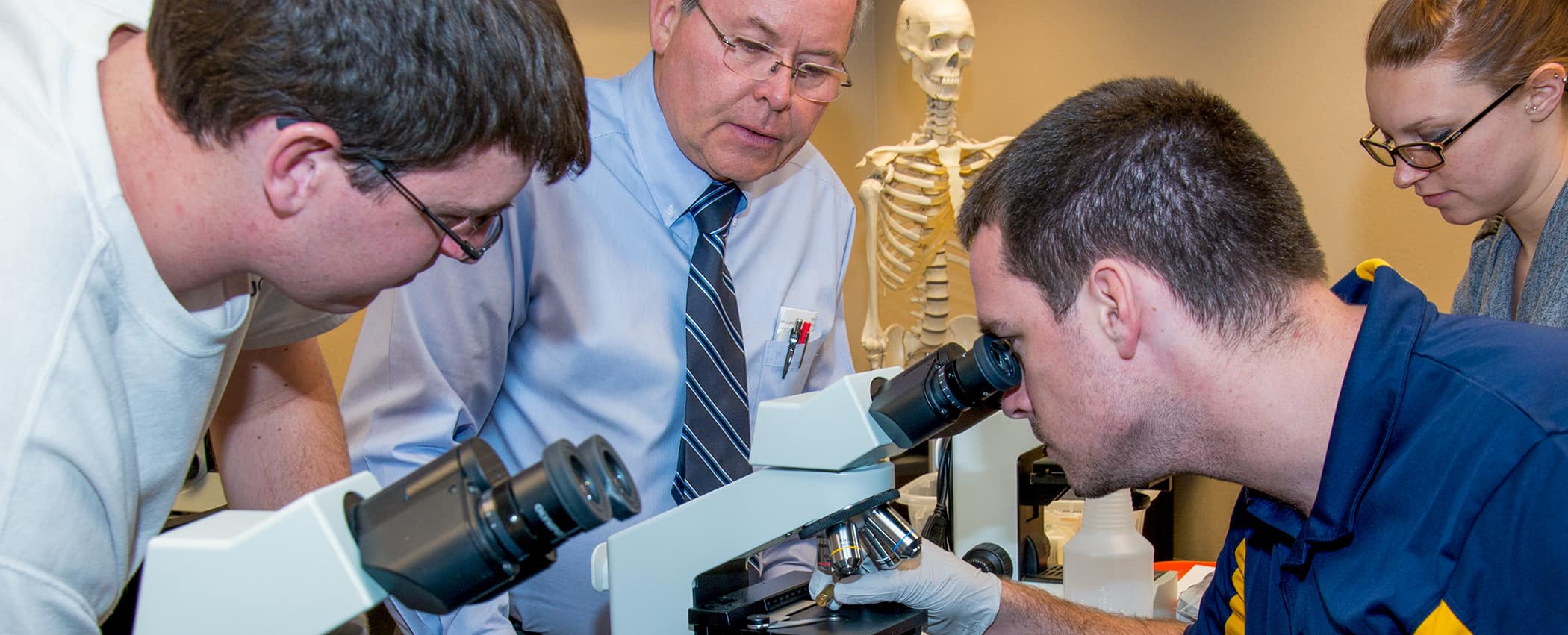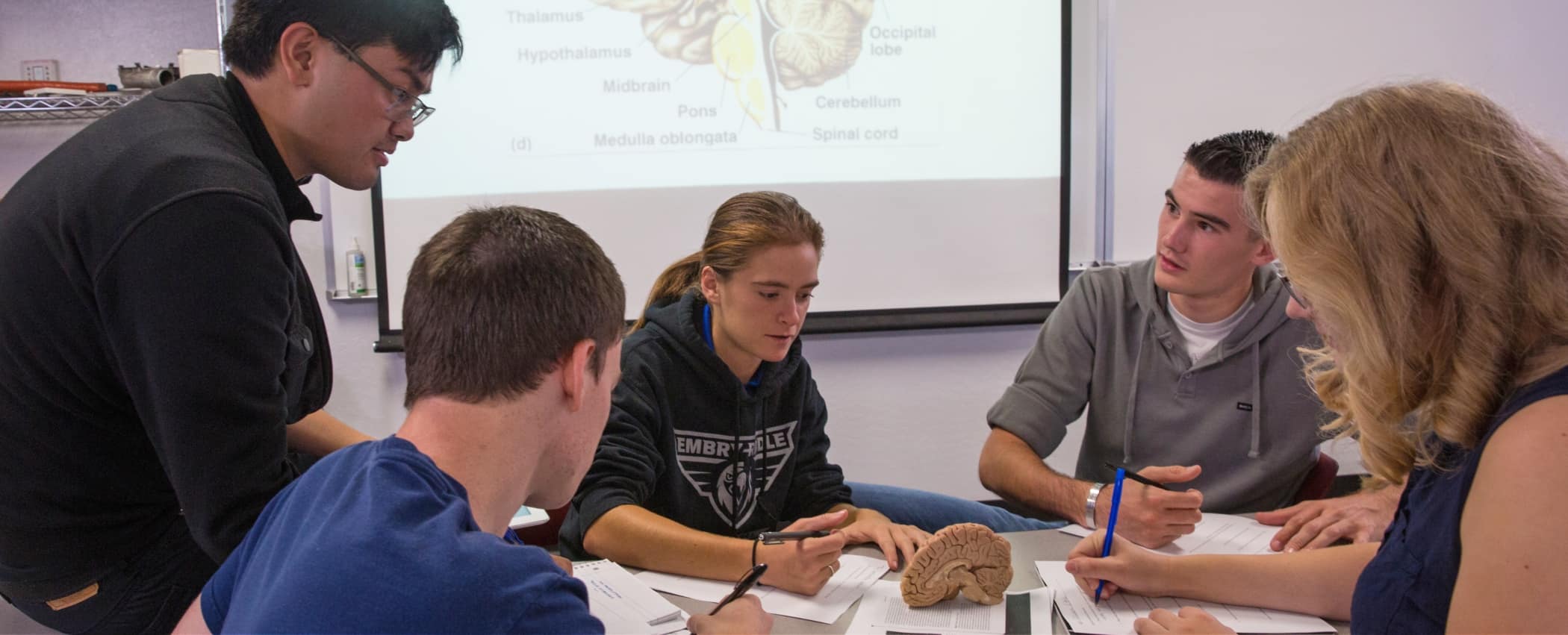
Bachelor of Science in
Forensic Psychology
This program prepares students for range of career options by blending psychological training with a solid foundation in forensic science and the U.S. legal system.
The Bachelor of Science in Forensic Psychology focuses on applying psychological research and evidence-based practices to the legal field. The Forensic Psychology program brings together many of Embry-Riddle’s strengths in areas such as applied psychology, social/behavioral research and the forensic sciences.
This degree is one of only a handful of forensic psychology bachelor’s programs in the nation. It is also one of only a few programs of its kind with courses taught by faculty (not graduate students or TAs), small classes and a wide range of hands-on activities.
In this program, students will learn how to:
- Inform legal arguments and judicial decision making
- Aid criminal investigations
- Aid persons in troubling situations (e.g., victims of crime)
Outside of the classroom, students have opportunities to mentor juvenile offenders, volunteer at local civil/criminal justice systems, conduct hands-on research, participate in professional networking and present at scientific conferences. Students are also encouraged to join the Psych Club (open to all majors without restriction) and PSI CHI (Honor’s Society).
Forensic psychology students graduate ready to enter careers in:
- Psychology
- Legal systems
- Law enforcement agencies
- Government security agencies
- Aviation
- Law firms
Graduates are also prepared to pursue postgraduate study in master-level and doctoral programs.
DETAILS
About Forensic Psychology at the Prescott, AZ Campus
Students in the Bachelor of Science in Forensic Psychology program receive a broad foundation in the psychological and forensic sciences through lab experiences, coursework and mentorship.
Psychological training is focused on gaining knowledge of the behavioral and social sciences and the role they play in understanding and predicting human behavior. Students combine their psychological training with a solid foundation in forensic science and the U.S. legal system.
Through courses in Perception & Cognition, Personality & Profiling, Training & Development and more, students improve their understanding of the science of psychology and become prepared to enter the industry.
Forensic Psychology students also have opportunities to work in our Forensic Science Laboratory, which offers space to learn forensic science techniques and carry out investigations related to criminal and civil cases.
Upon graduation, students can put their Forensic Psychology degree to use in a variety of areas, including:
- Evidence collection
- Psychological assessment
- Risk assessment
- Crime scene investigations
- Counseling
- Victim advocacy
The Bachelor of Science in Forensic Psychology degree is housed in the College of Arts and Sciences.
Student Learning Outcomes
Students will:
- Apply technology proficiently in forensic settings.
- Collaborate effectively in multi-disciplinary teams.
- Communicate effectively at a level appropriate to forensic audiences.
- Apply best practice guidelines, legal standards, and ethical conduct in various civil and criminal forensic settings.
- Apply fundamental research methods to evaluate issues pertinent to psychology and the impact of laws and policies.
- Apply theoretical foundations of psychology, with a focus on the convergence of psychology and the law.
- Analyze issues in forensic psychology and the intersection of psychology with the legal system.
- Compare contextual and developmental influences on individual and group behavior and diversity of perspectives when evaluating and intervening with forensic psychology populations.
Degree Requirements
Students in Forensic Psychology take 120 credits. The Bachelor of Science in Forensic Psychology can be earned in eight semesters, assuming appropriate background and full-time enrollment. Students are encouraged, but not required, to choose a minor field of study.
Program Requirements
General Education
Embry-Riddle degree programs require students to complete a minimum of 36 hours of General Education coursework. For a full description of Embry-Riddle General Education guidelines, please see the General Education section of this catalog.
Students may choose other classes outside of their requirements, but doing so can result in the student having to complete more than the degree's 120 credit hours. This will result in additional time and cost to the student.
| Communication Theory and Skills | 9 | |
| Computer Science/Information Technology | 3 | |
| Mathematics | 6 | |
| Physical and Life Sciences (Natural Sciences) | 6 | |
| Humanities and Social Sciences | 12 | |
3 hours of lower-level Humanities | ||
3 hours of lower-level Social Science | ||
3 hours of lower-level or upper-level Humanities or Social Science | ||
3 hours of upper-level Humanities or Social Science | ||
| Total Credits | 36 | |
Program Curriculum (33 Credits)
The following course of study outlines the quickest and most cost-efficient route for students to earn their B.S. in Forensic Psychology. Students are encouraged to follow the course of study to ensure they complete all program required courses and their prerequisites within four years.
Courses in the core with a # will satisfy general education requirements.
| BIO 120 & 120L | Foundations of Biology I and Foundations of Biology I Laboratory # | 4 |
| COM 122 | English Composition # | 3 |
| General Education - Communication Theory and Skills # | 6 | |
| General Education - Computer Science/Information Technology Elective # | 3 | |
| General Education - lower-level Humanities # | 3 | |
| General Education - lower-level or upper-level Humanities or Social Science # | 3 | |
| General Education - Mathematics Electives # | 6 | |
| General Education - Physical and Life Science (Natural Science) Elective # | 2 | |
| General Education - lower-level Social Science # | 3 | |
| Total Credits | 33 | |
Common Core (17 Credits)
| PSY 101 | Introduction to Psychology # | 3 |
| PSY 103 | Professional Development in Psychology | 1 |
| PSY 226 | Statistics for Organizational Analysis and Research ^ | 3 |
| PSY 322 | Research Design ^ | 4 |
| PSY 494 | Tests and Measurements Theory | 3 |
| PSY 496 | Capstone in Psychology | 3 |
| Total Credits | 17 | |
Basis of Psychology (12 Credits)
| Biological | ||
| PSY 310 | Sensation and Perception | 3 |
| or PSY 335 | Physiological Psychology | |
| Social | ||
| PSY 345 | Training and Development | 3 |
| or PSY 350 | Social Psychology | |
| or PSY 401 | Psychology of Leadership | |
| Normative | ||
| PSY 354 | Developmental Psychology | 3 |
| Non-normative | ||
| PSY 365 | Abnormal Psychology | 3 |
| Total Credits | 12 | |
Forensic Psychology Core (12 Credits)
Choose a total of four (4) courses from the list below:
| PSY 306 | Psychology of Deception Detection | 3 |
| PSY 313 | Personality and Profiling | 3 |
| PSY 336 | Forensic Psychology | 3 |
| PSY 337 | Criminality | 3 |
| Upper-level PSY courses with a Forensic Psychology Focus (approved by Chair) | 3 | |
Investigations and the Law (13 Credits)
| PSY 320 | Aviation Psychology | 3 |
| SIS 200 | Introduction to the U.S. Legal System | 3 |
| SIS 220 | Investigative Methodology and Forensic Science | 4 |
| SIS 308 | Courts and Criminal Justice | 3 |
| Total Credits | 13 | |
Designated Electives (18 Credits)
Choose a total of six (6) courses from the list below:
| ACC 329 | Forensic Accounting and Fraud Examination | 3 |
| BA 201 | Principles of Management | 3 |
| BA 319 | Managerial and Organizational Behavior | 3 |
| CS 304 | Introduction to Computer Forensics | 3 |
| SIS 340 | Security Investigations and Interview | 3 |
| SIS 342 | Interview Techniques and Tactics | 3 |
| SIS 352 | White Collar Crime | 3 |
| SIS 411 | Procedural Laws and Evidence | 3 |
| SS 327 | International Relations | 3 |
Upper-level PSY Courses (May take up to six PSY UL courses) | ||
Open Electives (15 Credits)
| Open Electives | 15 | |
| Total Credits | 120 | |
- #
General Education Courses
- ^
PSY 226 and PSY 322 are rigorous, foundational courses in the field of psychological sciences. Therefore, both must be taken at ERAU to ensure students receive the highest quality of instruction, as well as benefit from the university's unique academic resources.
All Army ROTC students are required to complete SS 321 - U.S. Military History 1900-Present (3 credits) in order to commission.
Suggested Plan of Study
| Freshman Year | ||
|---|---|---|
| Fall | Credits | |
| COM 122 | English Composition | 3 |
| Mathematics Elective | 3 | |
| Open Elective | 3 | |
| PSY 101 | Introduction to Psychology | 3 |
| Social Science Elective | 3 | |
| UNIV 101 | College Success | (1) |
| Credits Subtotal | 15.0 | |
| Spring | ||
| BIO 120 & 120L |
Foundations of Biology I | 4 |
| Humanities Lower-Level Elective | 3 | |
| Mathematics Elective | 3 | |
| PSY 103 | Professional Development in Psychology | 1 |
| PSY 354 | Developmental Psychology | 3 |
| PSY 320 | Aviation Psychology | 3 |
| Credits Subtotal | 17.0 | |
| Sophomore Year | ||
| Fall | ||
| Communications Elective | 3 | |
| Computer Science/Information Technology | 3 | |
| Physical and Life Sciences (Natural Science) | 2 | |
| PSY 310 | Sensation and Perception | 3 |
or PSY 335
|
Physiological Psychology | |
| PSY 365 | Abnormal Psychology | 3 |
| Credits Subtotal | 14.0 | |
| Spring | ||
| Communication Elective | 3 | |
| Open Elective | 3 | |
| PSY 226 | Statistics for Organizational Analysis and Research | 3 |
| SIS 200 | Introduction to the U.S. Legal System | 3 |
| SIS 220 | Investigative Methodology and Forensic Science | 4 |
| Credits Subtotal | 16.0 | |
| Junior Year | ||
| Fall | ||
| Open Elective | 3 | |
| Open Elective | 3 | |
| PSY 322 | Research Design | 4 |
| PSY 336 | Forensic Psychology | 3 |
| SIS 308 | Courts and Criminal Justice | 3 |
| Credits Subtotal | 16.0 | |
| Spring | ||
| Designated Elective | 3 | |
| Humanities or Social Science Upper-Level Elective | 3 | |
| Open Elective | 3 | |
| PSY 345 | Training and Development | 3 |
or PSY 350
|
Social Psychology | |
or PSY 401
|
Psychology of Leadership | |
| PSY 337 | Criminality | 3 |
| Credits Subtotal | 15.0 | |
| Senior Year | ||
| Fall | ||
| Designated Elective | 3 | |
| Designated Elective | 3 | |
| PSY 306 | Psychology of Deception Detection | 3 |
| PSY 494 | Tests and Measurements Theory | 3 |
| PSY 496 | Capstone in Psychology * | 3 |
| Credits Subtotal | 15.0 | |
| Spring | ||
| Designated Elective | 3 | |
| Designated Elective | 3 | |
| Designated Elective | 3 | |
| PSY 313 | Personality and Profiling | 3 |
| Credits Subtotal | 12.0 | |
| Credits Total: | 120.0 | |
- *
Based on student interests, PSY 496 Capstone in Psychology may be taken in the Fall or Spring semester.
Get Started Now:
Summary
122-123 Credits
Estimate your tuition by using the Tuition Calculator
View Financial Aid Information
Learn about our General Education
Find out about transferring credits to this degree
Learn more about our Veterans & Military benefits
View our Academic Calendar



